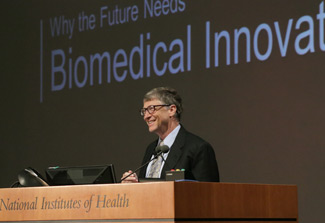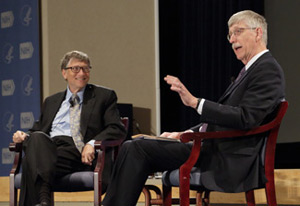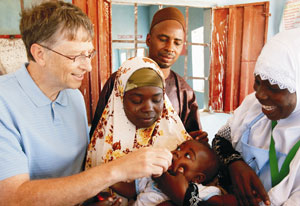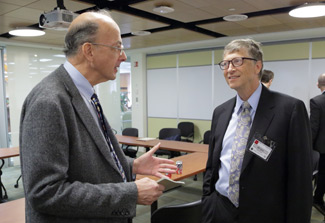Bill Gates celebrates research collaborations with NIH
January / February 2014 | Volume 13, Number 1

Photo by Bill Branson/NIH
Bill Gates, speaking at the 13th annual David E. Barmes
Global Health Lecture, thanked NIH for partnering with his
foundation on research.
Watch the recorded webcast of
Why the Future Needs
Biomedical Innovation.
By Cathy Kristiansen
Global health philanthropist Bill Gates paid tribute to the numerous flourishing partnerships between his family foundation and the NIH, during a recent visit to the Bethesda campus. Research innovations are helping reduce the toll of malaria, tuberculosis, HIV/AIDS and malnutrition, but Gates noted much is left to be accomplished before global health equity is achieved.
Gates said the two organizations are united by their common goals of improving health and understanding the root causes of disease so that effective interventions can be developed. He thanked NIH for the relationship, adding, "It's great to see that the partnership is growing over time."
The co-chair of the
Bill and Melinda Gates Foundation visited NIH to deliver the
annual David E. Barmes Global Health Lecture, titled "Why the Future Needs Biomedical Innovation." The event honors its namesake for his career spent improving health in low-income countries and is co-sponsored by NIH's
National Institute of Dental and Craniofacial Research (NIDCR) and Fogarty.

Photo by Bill Branson/NIH
Global health philanthropist Bill Gates and NIH Director
Dr. Francis S. Collins see synergies in their efforts to find
new vaccines for HIV/AIDS, malaria, tuberculosis and
other diseases.
In introducing Gates,
NIH Director Dr. Francis S. Collins hailed him as "one of the makers of the modern world" and a "visionary" in global health. "Bill Gates sees what is absent. And he sees what should exist in that space," Collins said. "He sees solutions from the micro to the macro level that no one envisioned before him. More than that, he has the energy and the perseverance to give concrete form to his visions and so transform the world."
Collins credited the foundation with catalyzing the private sector, pioneering agreements in intellectual property to improve patient access and funding development of lifesaving interventions such as the meningitis vaccine, a point-of-care diagnostic for TB and synthetic artemisinin to ensure supply of this critical malaria therapeutic.
NIH-Gates Foundation collaborations include research on a biomarker for the river blindness parasite, studies to better understand how enteric infections and malnutrition undermine the immune system (the
MAL-ED project), and development of low-cost methods to control malaria and dengue.
Vaccines hold promise
Gates recalled the early days of his interest in global health, when he and his wife, Melinda, learned from an article that hundreds of thousands of children died every year of rotavirus - a diarrheal disease they'd not heard of - mainly in poor countries, and vaccines to protect them were just nearing licensure. Today, one of their foundation's key goals is to provide disadvantaged children with protection against rotavirus and other killers.
"Vaccines, after all, are pretty magical," said Gates, who toured several NIH vaccine labs during his visit. "Over time, the cost of making most vaccines will get down to something like 20 or 25 cents per child treated and yet it can give you lifelong protection."
One disease he hopes to eliminate by 2018 is polio. In addition, he is promoting distribution of vaccines against child-killing pneumococcus bacteria and rotavirus - including a new rotavirus vaccine produced by India's Bharat Biotech International - that could save 2.3 million lives by the end of this decade. Such success would be "very worthwhile, kind of a miracle compared with all the other health problems we talk about," Gates said.
He added he's "thrilled" that NIH researchers and foundation-backed investigators are "pushing forward" on HIV and other vaccine research, for instance in investigating pathogens for which natural immunity is almost nonexistent and studying additional vaccine constructs, such as those involving DNA/RNA and viral vectors. Whether researchers can devise an HIV vaccine, he said, "Certainly, I'm optimistic, although you couldn't give a time frame for it."

Photo courtesy of the Bill and Melinda Gates
Foundation / Prashant Panjiar
The Bill and Melinda Gates Foundation partners with
NIH in vaccine development and other global health
research to lessen the world's disease burden.
Making wise funding choices
Prioritizing research projects is a challenge, he noted, with NIH and the Gates Foundation together accounting for about half of all global health research funding. Gates said his foundation identifies which health areas to support by analyzing how to bring the highest possible disease reduction for each dollar spent. "We want to have as much impact as we can," he said, noting his funding decisions incorporate the extent to which a particular disease undermines a person's ability to be productive - a measure known as DALY or disability adjusted life years lost.
Although the foundation focuses on infectious diseases with high DALYs, it also supports research into chronic health conditions with long-term impact, such as child under-nutrition and an often detrimental condition that affects every country in the world - preterm birth. Gates added that if NIH eventually devises a cost-effective intervention for a chronic disease such as cancer or diabetes, "we will get right on making sure that it gets delivered to the poor world. We're all about health equity."

Photo by Ernie Branson/NIH
Fogarty Director Dr. Roger I. Glass discusses global health
research and training with Bill Gates, who delivered the
annual Barmes Lecture, co-sponsored by Fogarty and
NIH's NIDCR.
Given the enormous value of NIH's contributions to global health, Gates said he is "disappointed" that its funding is dwindling even as other countries are increasing theirs. Bolstering research spending is a wise decision that will help check rising health care costs at home as well as abroad, he explained. "Investing in research has huge paybacks, paybacks in improving the human condition and paybacks in reducing health costs as you get new tools," he said. "I am an optimist. I think we'll be able to convince people that those investments should be restored and grow."
Only hours after Gates' talk, President Obama announced a
new NIH initiative to seek an HIV cure supported by $100 million in re-prioritized funds over the next three years. Obama also promised the U.S. will match $1 for every $2 contributed to the
Global Fund to Fight AIDS, Tuberculosis and Malaria by its multiple governmental and private partners. This could mean as much as $5 billion from the U.S. over the next three years. For its part, the Gates Foundation pledged up to $500 million in matching funds, adding onto the total $1.4 billion it has already given.
Improving health with technology
Gates, whose technological innovations and wealth as co-founder of Microsoft have enabled him to devote billions of dollars to global health, commented on how solutions can be found by harnessing innovations from diverse disciplines. "Sometimes the technology you want to use is not obvious ... so we need to challenge people from different realms," he said. As an example, he cited chemists who created a 'superthermos' that could sustain cold temperatures without substantial energy input, but who had not automatically seen its application for global health - keeping vaccines cold in low-resource settings.
Technology such as Internet access and cellphones can improve global clinical practice in a "phenomenal" way, he noted, for instance in advancing record keeping, measurement and quality of care, monitoring cold storage and providing advice and training to health care workers. Diagnosis might also be enhanced in some cases by use of digital cameras and processing software, he added.
Yet, new technology should be introduced in a measured way, he cautioned, saying, "In many countries, you don't want to force [the introduction] prematurely. You've got to have a certain level of quality before it becomes a net benefit."
Expanding training through online courses
Gates noted that technology could play an important role in expanding the number of health care professionals trained in countries with heavy disease burden, particularly Africa. "It would be ideal if you can get the scientific knowledge there and the treatment knowledge there to be much higher," he said. "The gaps are pretty huge and we're only making modest progress."
One important way to advance learning is by increased use of free and interactive online teaching tools. The Gates Foundation is a significant funder of massive open online courses, or MOOCs. "People watching a video lecture with somebody interesting who's giving examples and who's forcing them to answer a few questions to see if they're gaining the knowledge, that works better than if you're just throwing them the textbook," Gates said.
Students still need ways to have questions answered in a timely way, so further refinement of this teaching tool is needed, he added. But, he said, overall "it's very exciting that a large cohort that otherwise wouldn't have had access to a world class education will be able to get it through these online means."
Working toward health equity
Gates concluded that his foundation will continue to prioritize global health for many decades to come and he welcomes facing the challenges ahead in partnership with NIH. "Most people are born and die and never see a doctor," Gates said. "As long as there's health inequity, poor children have more risk of getting these diseases and there'll be a lot that we can do."
More Information
To view Adobe PDF files,
download current, free accessible plug-ins from Adobe's website.